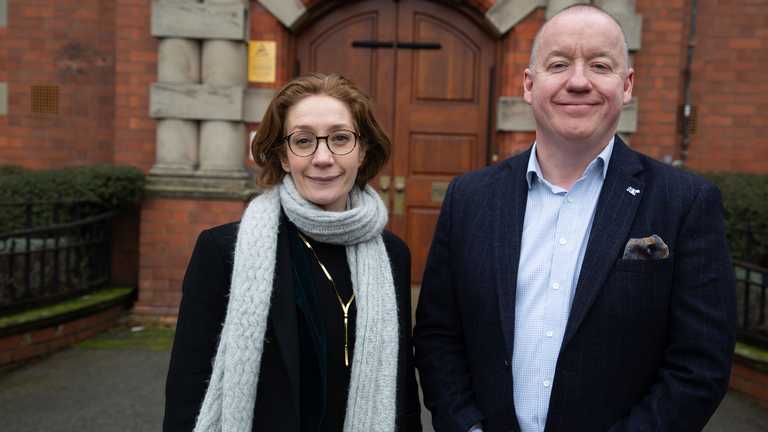

Loading search...
Loading search...
Loading site search...
Loading site search...
Loading site search...
Loading...
Loading site search...
Loading site search...
Posted 20 May 2015
We hope that the connections made at the conference will help develop new business opportunities and show what UKTI can do in support of this objective.”

Opportunities for UK companies to export their products across the globe were explored at a special event at Harper Adams University on Tuesday – day two of Export Week 2015.
UK Trade and Investment (UKTI) and Harper Adams united to run a West Midlands conference for business leaders on “Agriculture and Export – Taking the agri-tech sector international”, to mark the recent launch of the Milan Expo. The Expo has the theme of Feeding the Planet, Energy for Life.
Paul Noon, Regional Director of UKTI, opened the conference and commented on the ‘world class’ education and research provided by the University and its importance to the development of agri-tech exports.
Delegates filled the lecture theatre in the Regional Food Academy to listen to Harper Adams Vice-Chancellor, Dr David Llewellyn, as he outlined the university’s international activities and the importance of exporting knowledge and skills as well as physical products, to enable UK businesses to operate successfully in international markets.
Dr Llewellyn said: “We were delighted to be asked by UKTI to participate in this event which comes at an important time for the agri-tech sector. There was clearly great enthusiasm amongst the business leaders for developing export markets, and it was good to be able to put them in touch with UKTI experts from a wide variety of countries. We hope that the connections made at the conference will help develop new business opportunities and show what UKTI can do in support of this objective.”
David O’Hare, CEO of Shropshire-based Fullwood Ltd, shared the company’s experiences of winning work overseas, including the development of robotic milking systems in two regions of Russia, achieved after the company engaged with UKTI, and the design and installation of the world’s first mechanised camel milking facility in Dubai. He stressed the importance of market research, selecting the right in-country partners, and exposing senior managers to the customers’ culture.
Later, a panel comprising trade advisers from overseas markets with major agri-tech opportunities, including Brazil, Slovakia, Poland, Pakistan, Russia and Turkey, shared details of those opportunities before a question and answer session chaired by UKTI Agri-Tech Trade Specialist Luis Mulet.
Konrad Kubacki, Business Services Manager at BPCC Trade in Poland, explained that the Polish agricultural sector had undergone a transformation since the 1990s, restructuring from big, public enterprises to many, small enterprises. There is now a programme of modernisation – with major changes bringing a wealth of export opportunities. About £136 billion of European funding is due to be invested in sector in the coming year, with new machinery being key, as well as activities to help businesses grow in size.
Bettina Molnarova, from the British Chamber of Commerce - Slovak Republic, explained that her country had seen a decline in agricultural production over the last decade, becoming a net importer - fresh vegetables were hard to come by. The government is now pushing towards a target of 80 per cent self-sufficiency, but the only Slovakian commodity currently hitting that target was beer! Areas of opportunity include machinery, seeds, pesticides and crops including radishes and garlic.
Guliz Kiymaz, UKTI Agriculture & Food and Drink lead, said that Turkey had opportunities in animal health, crop protection, precision farming, irrigation, organics and more. The Turkish population is expanding rapidly – the average age is 30 and the nation aims to be one of the top five agri-food producers by 2030. Turkish officials will be keen to explore opportunities at the UKTI Agri-tech Expo in Milan in July.
Pakistan exports a lot of produce, explained Trade and Investment Manager Sara Ibtasar, based at UKTI Lahore, therefore opportunities lie in science and technology that will allow production to continue and to grow. “We are looking for vaccines, because we have a lot of animals dying”, she said. Another area of interest was silage-making machinery, and with four large, government-owned research institutions, Pakistan is also open to international research collaboration.
Cliff Wilson, Deputy Head of the UKTI Agri-Tech Organisation, gave more information on the Milan Expo, highlighting dedicated events for animal health, aquaculture and precision agriculture, on July 7, 8, and 9.
Topics in the Q&A sessions covered key routes to market for agricultural machinery and specialist technology, the need for improved skills in country to use advanced equipment, cider production in Poland, overcoming currency problems, banking processes – particularly the importance of alerting businesses’ banks to incoming transactions from overseas - together with marketing and tips on how to address cultural and language barriers.
Following a lunch break and exhibition, delegates took part in round-table discussions, as well as tours of the Agricultural Engineering Innovation Centre at Harper Adams.










We use cookies to ensure that we give you the best experience on our website. If you continue without changing your settings, we'll assume that you are happy to receive all cookies on the website. However, you can change your cookie settings at any time.